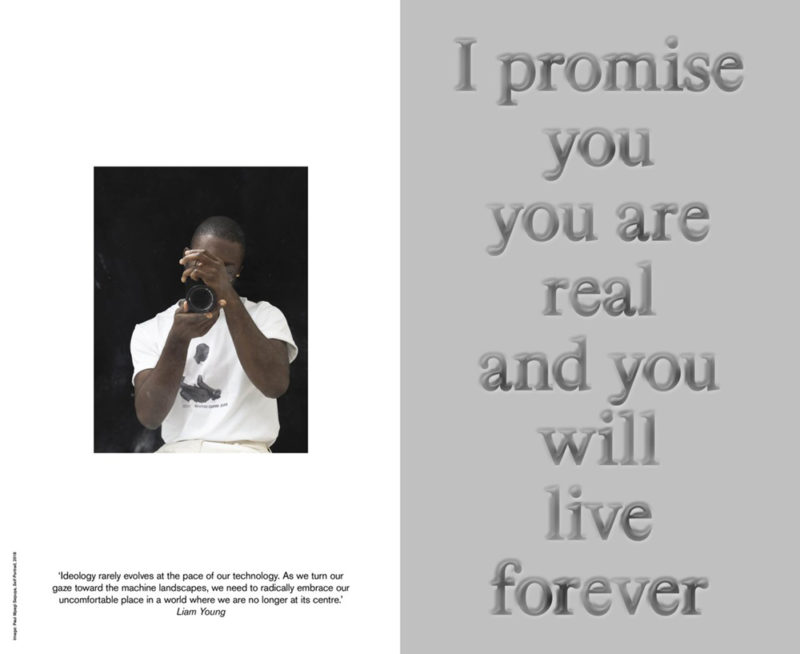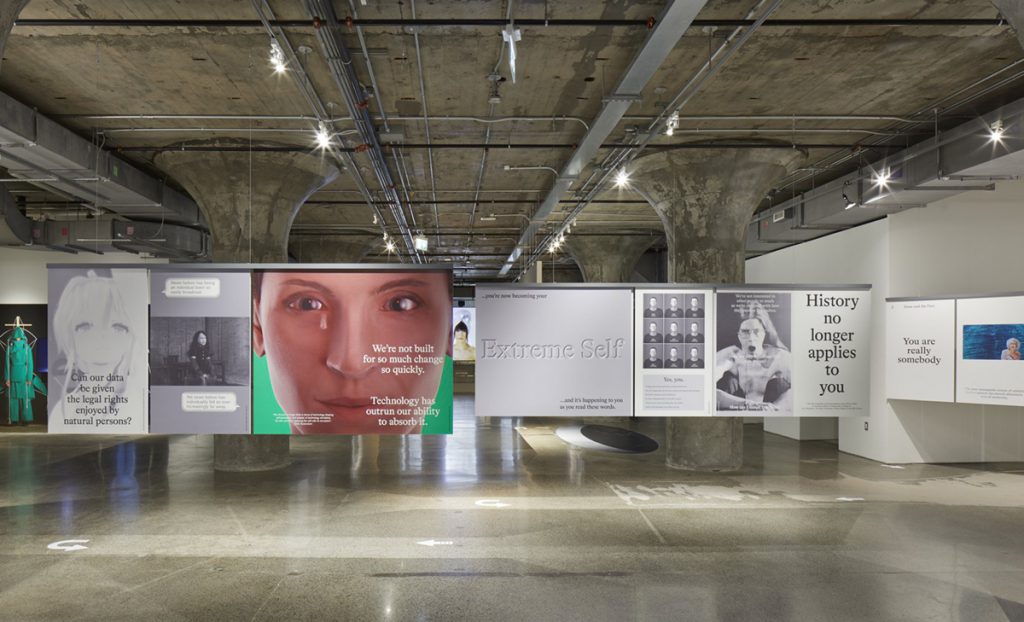Data Smudge: Age of You at MOCA Toronto
2 April 2020
By Rowan Lynch
When I am alone, my phone screen is the first and last thing I interact with over the course of a day. I would prefer to be someone who reads themselves to rest, rather than making my stilted way towards unconsciousness in my phone’s dim light, but this pattern has run largely uninterrupted for years. Letting the phone absorb my attention is seductively comforting; it works as a numbing agent allowing me to effortlessly leave my physical environment, all shrouded in an intangible promise of productivity. In exchange, it blurs my free time into a flatlined haze. I use it in this capacity constantly, despite feeling I know better, and the efforts I make to reject the exhausting pace it promotes. It is a pace I feel my body has unconsciously come to match.
The description for MOCA’s exhibition Age of You begins, “If you’re wondering why the inside of your head feels so strange these days, this exhibition is for you.” (1) It is hard to deny I am implicated. Age of You is a group show predominantly featuring a series of posters bearing text by Shumon Basar, Douglas Coupland, and Hans Ulrist Obrist, the starry curatorial collective responsible for the exhibition. In a choice in line with the frantic pace of digital life, Age of You boasts over seventy artists, with the majority of these contributors providing images folded within the 2D space of these posters. These works often feature a human figure or face, while the text moves across themes relevant to a post-digital age, divided into chapters with titles like “Post-Work,” “Virtue Power,” and “The End of Democracy.” Video works and sculptures by the remaining participants are tucked into the gallery’s peripheries. A pre-flattened experience, Age of You photographs easily. I suspect the curators enjoyed imagining it being shared digitally.

Age of You claims to be an “exhibition about how the self has become more extreme, and what it means to be an individual today.” (2) While the curators are apparently keen to communicate that the post-Internet era has been defined by a shift in individuality, Age of You avoids any concrete conclusion on the implications of such a shift. The term “The Extreme Self” is repeated, but with opaque results. “The Extreme Self has a hard time sitting beneath a tree and contemplating the universe.” and, “Workers inside the Extreme Self economy only feel comfortable if their labour in some way feels a part of a personal story board.” are some of these instances. While dressed as proverbially universal, these statements feel expressive of little more than well trodden derision for stereotypical millennial traits. Continuing through two entire floors of MOCA, the exhibition ranges from mentioning the influence of digital mediation on relationships, security, labour, and democracy, but with little interest in connecting these ideas or highlighting the works of art present. The overwhelming number of statements and their apparent disunity is reminiscent of a trend in online space, where a poverty of meaning can exist amidst a flood of information.
The text stylistically favours an individual as well, continually addressing the visitor directly, often in an uncomfortably paternalistic tone. Standouts include, “Seriously, make sure you have at least one real world skill,” “You are overempowered”, and “You deserve it all.” This dual thematic and stylistic focus on individuality feels misguided, when in contrast to an individual’s control over the everyday nuances of their relationship with technology, there stands the reality that understanding, accessing, and deploying methods of surveillance and data collection remains largely the territory of states and corporations. The value of information is a globally relevant question, exemplified in Toronto by Google’s Sidewalk Labs project, (3) a proposed renovation of the waterfront that has received repeated criticism for its intentions regarding the storing and use of data it will collect from its “smart” infrastructure. As monetization of data erodes the assurance of consumer privacy, an understanding of digital infrastructure is a step towards security, both personal and within our physical environment. Widely used terms like Apple’s “iCloud” naturalize the impression that our digital lives are conveniently free of concrete impacts. Age of You comments on this potential for exploitation, but confusingly upholds this naturalization in several instances, with a poster reading, “You’re leaving a huge data smudge in the world, but it’s not in the physical world, it’s up in the cloud.” It is valuable to demystify the processes by which the Internet exists precisely in order to remember that there are layers of labour and ownership at every level. Focusing purely on the individual cannot capture the enormity of the situation.

Age of You provides a survey of keywords and concepts relevant to contemporary life, wrapped in distant and unempathetic curatorial framing. Seeing prescient subjects skimmed is frustrating, and doubly so when represented by a collaboration between a celebrity team and a large institution, each with their own uniquely high levels of access to both funds and collaborators. The Internet is deeply embedded in our lives, and we live with a dull understanding that there is no going back. I receive work emails at night from multiple part-time jobs, clock in with apps that relay my location to my employers, and clock out with the knowledge that they follow me home in my pocket. It feels necessary to accept the effort and complexity involved in discussing the ways we are defined by technological advances. I am always wondering, what skills can we build to better this state of life? It is the pressing nature of this question that makes Age of You feel like a missed opportunity.
- “Age of You – Programmes 2019.” Museum of Contemporary Art Toronto Canada. Accessed February 14, 2020. https://moca.ca/age-of-you-programmes-2019/.
- Ibid.
- https://www.sidewalktoronto.ca
Age of You ran from September 5, 2019 – January 5, 2020 at MOCA Toronto.
Feature Image: Installation view of Age of You. Photo by Tom Arban Photography Inc. courtesy of MOCA.



